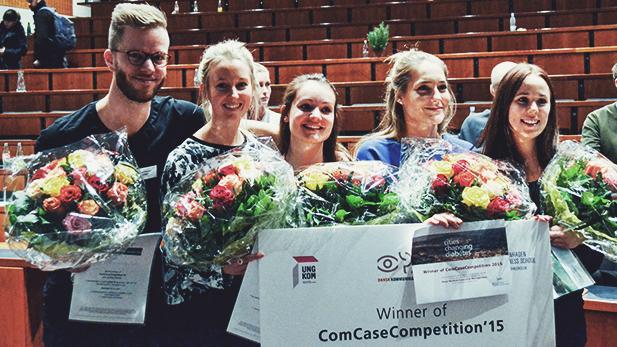24 hours with communication and sleeping bag

Front page photo: Danish Communication Association. Photo: Isabella Eid. Pictured are winners of ComCaseCompetition. From the left; Jeppe Fisher, Katrine Bach Mølkjær, Terese Faurholt, Anna Teresia Berner Møller og Maria Homann.
A group of students rush down the steps in the Solbjerg Plads lobby at CBS. A female student hands a USB stick to one of her team mates.
- Three minutes to deadline! Hurry, she says, before he rushes off.
It's 11:57 and the students have three minutes to hand in their groups' solutions to the ComCaseCompetition, a case competition in global communication.
This year the case company and the 11 teams had to come up with solutions to help global cities prevent diabetes in the project ”Cities Changing Diabetes”. The competition ran for 24 hours 27-28 January and is a cooperation between CBS, Dansk Kommunikationsforening (Danish Communication Association) and Unge Kommunikatører (Young Communicators).
Really hard and really fun
When the ComCaseCompetition organisers say that the event takes 24 hours, they are not kidding. A group of female students have just handed in their solution, and they think they have managed three hours of sleep – tops.
Stephanie Kristensen, Cathrine Holstein and Laura Trampe are all MSc students in Business Administration and Organisational Communication at CBS while the fourth group member, Adina Buculeu is a master student in Culture, Communication & Globalization at AAU.
They have been working in a CBS group room for 24 hours and their sparse sleep was even disturbed by the cleaning service. All four agree that participating in the competition has been really hard and really fun.
- We have been under extreme time pressure, and it has been hard. But at the same time we have had fun. Because when you put a small group of people in a room for that long, they get carried away some times, says Cathrine Holstein.
Healthy footprints
The competition was won by Terese Holm Faurholt, Anna Teresia Berner Møller and Maria Nissen Homann, students at CBS, and Jeppe Fisher and Katrine Bach Mølkjær from Aarhus University. Their idea is based on the concept of ’nudging’, using simple and positive measures to change people's behaviour. For example, the group suggests making footprints around the city to encourage people to e.g. take the stairs instead of the elevator.
- We are very pleased with the competition and especially with the winning solution. The group has come up with a solution that is feasible in all the cities, and which in a simple and positive way can encourage citizens to a healthier life style, says Mike Rulis, Senior Vice President of Communications, Novo Nordisk A/S in a press release.
Dinner with Novo
The winning team will be having dinner with a Novo Nordisk executive and will be participating in the KomDag'15 conference. All team suggestions are submitted to Novo Nordisk and the partner companies have previously contacted teams, even those who were not among finalists.
Karl-Heinz Pogner, PhD and Associate Professor at CBS, is one of the founders of the ComCaseCompetition and he is very proud of the outcome of this year’s ComCaseCompetition.
- It has been a great event – to use a Novo Nordisk phrase it is “a win-win-win”. The students got an incredible, realistic learning experience, the business world and the communication industry got a lot of food for thought. The same did academia, that showed how much it can contribute to business’ and society’s reflection when co-creating with business and students. Especially when it is done ’step-by-step’. I am looking forward to the next step: a #LivingCityLab about ‘Health in the city´. Watch out for it in March!
Read more about Health in the city
For more information contact Associate Professor Karl-Heinz Pogner